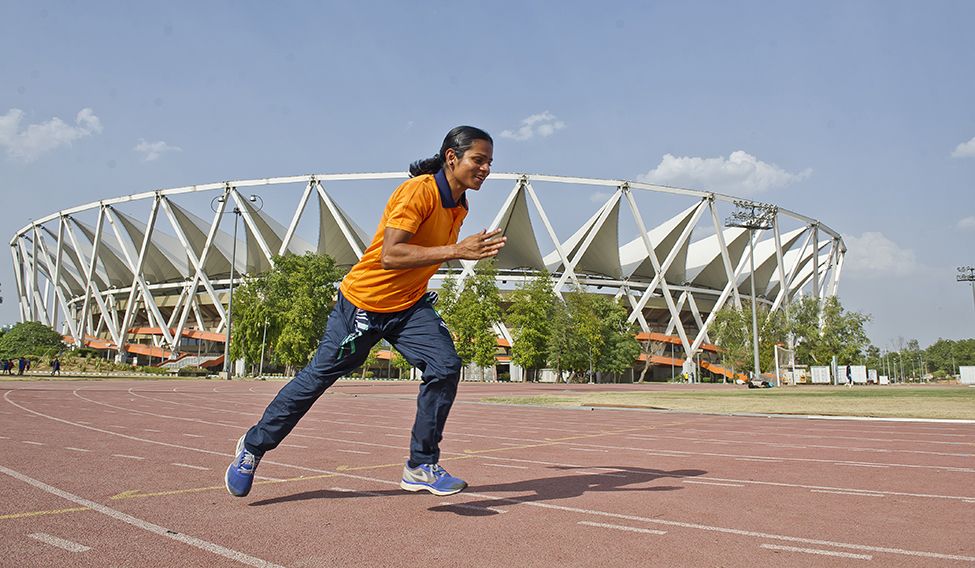It’s not easy to be Dutee Chand. Leave alone be Dutee Chand, it’s not easy to be an athlete in this country.
And if by any chance they suspect you of having high levels of naturally-occurring testosterone, they not only bar you from competing but also allow your name to be leaked, making you an ‘object of curiosity and ridicule’. And then half of the premier National Institute of Sport, Patiala, starts cat calls and all you hear in the corridors and on the track is, ‘hey, isn’t that Dutee Singh?’ And there are no options in life. Except run... and run fast. But that’s exactly what Chand does for a living.
Chand, impoverished from childhood but born with a fistful of dreams, runs fast; fast enough to be the fastest Indian woman over 100M. She has also since 2014 been running away from herself and the world in general. Some believe she is a woman; others use the convenient term ‘intersex athlete.’
In the end, her belief in she was ‘created by God’ as she says, takes Chand to the Court of Arbitration for Sport and there she wins the case not only against the IAAF but also the Indian body AFI, who by the way, didn’t stand by her. CAS gave the IAAF two years to prove that hyperandrogenism provides a significant athletic advantage.
Now, last week, CAS has extended the suspension of the International Association of Athletics Federations’ rules on hyperandrogenism by another six months. But will the battle end there?
Can Chand walk freely? Will the stares stop? Will the questions be about her talent and ability than the natural testosterone that her body produces? Will the world understand that athletes from developed countries have a bigger advantage than just the testosterone in Chand’s 21-year-old body? It’s a battle that the girl from a small village in Odisha has learnt to fight.
Chand and her coach S. Ramesh are happy; in fact, relieved. Sometimes, the emotions border on irrational exuberance. But these are early days. Yet Chand cannot forget that there is the constant tick-tick of the clock reminding her that the IAAF may come back with more evidence and ban her from running. But for the moment, she believes she can reach the Gold Coast for the Commonwealth Games this year.
Before that, she is in Hyderabad where she trains and stays at the Pullela Gopichand Badminton Academy. She prefers to live among some of the best badminton players in the world. She feels safe there. Not at NIS, Patiala. The latest CAS ruling gives her hope that maybe, some day, IAAF may just learn that hyperandrogenism doesn’t increase athletic ability in women athletes. CAS would then throw out the case and athletes like Chand would run freely.
“But I am used to adversity,” she says. “It’s a condition since childhood. Yes, when this thing came upon me in 2014 and they called me whatever they wanted, I almost gave up. But I fought back and it’s good to know that I can run at the Commonwealth Games.”
In a way, it’s justice. She was denied this in 2014 and now there is the huge opportunity of running alongside some of the best in the world—Jamaicans, Nigerians, Australians and Canadians. Though the qualifying times for the Commonwealth Games and the Asian Games are not out yet, Chand promises to stretch every sinew to make it possible. If she makes it to the CWG and lines up for the finals, that would be, in a way, vindication.
Ramesh, her coach, who has stuck with her and hopes that she would be the first Indian woman to reach an Olympic final, says, after hearing that CAS has extended the suspension of the IAAF rules on hyperandrogenism, “Mentally, it’s a relief. For an athlete and a coach, it is a big deal to be able to work in an environment where you are not in fear of not being able to participate. We would work and ensure that the timings are good.”
Chand now goes to Iran for the Asian Indoor Athletics meet from February 1-3.
“I had participated in the 2015 Indoor meet and did a time of 7.28sec,” says Chand. “That was good enough for a bronze. But I hope to improve.” In the indoors, it’s 60M compared with the 100M outdoors.
Chand is the national record holder in the 100M with a time of 11.30sec. When she qualified for the Rio Olympics, it came on a fast track in Almaty with a timing of 11.24sec. Though the timing was enough to qualify, the AFI didn’t ratify it, saying the lab there wasn’t recognised by the IAAF. Her 11.30sec at the Indian GP in New Delhi stands as the national record.
It’s a new season; new beginnings. For Chand, it always been about running.
“I only know how to run,” she says with that beaming smile. Hopefully in the next two years, all the running would be on tartan tracks and not towards the courts in trying to have to define herself again and again.





